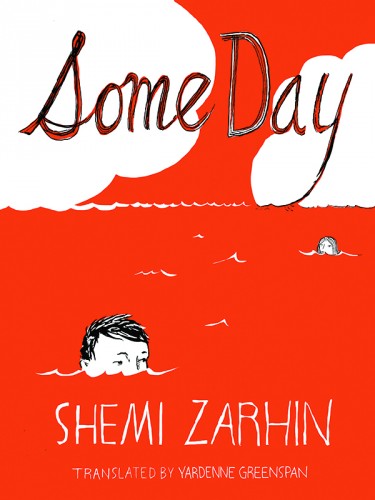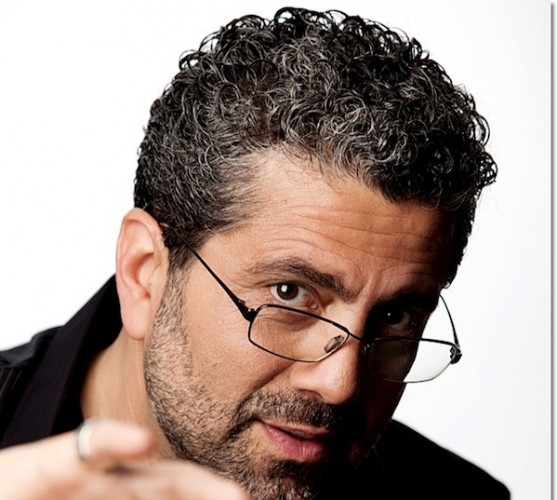Book Review: “Some Day” — A Memorable First Novel about Waiting for Love
In “Some Day,” Shemi Zarhin has masterfully woven together a tangle of bittersweet tales and elusive dreams. It is a book that is a pleasure to read and reread.
Some Day by Shemi Zarhin. Translated from the Hebrew by Yardenne Greenspan. New Vessel Press, 451 pp, $16.99.
By Susan Miron
Shemi Zarhin’s Some Day opens unforgettably: “Two seven year olds lie on the roof. A boy and a girl. The boy is Shomi, the girl is Ella. They lie among the water boilers and watch a dead body being pulled out through a window.” The body is Ella’s father who had dropped dead shortly after arguing politics with Sholmi’s father, Robert.
Most of the enormously likable cast of characters are related to Shlomi or Ella – or both, which makes for all sorts of bizarre liaisons and catastrophic domestic complications. The roof – and his virtuoso cooking – will continue to be a refuge for Shlomi for years to come.
Some Day‘s sprawling storyline spans three generations and fifteen years in the emotionally and sexually convoluted lives of Ella’s and Shlomi’s families. Garcia Marquez (Love in the Time of Cholera) would applaud Zahrin’s portraits of two men waiting almost hopelessly for their true loves to change their minds.
Prior to being pulled out through the window, Ella’s father, Schumel, a Shoah survivor, is arguing about politics (Golda and Ben-Gurion) – a favorite Israeli occupation – with Shlomi’s father, Robert. After Shmuel dies, Robert is comforted by his wife (and Shlomi’s mother), Ruchama: “Don’t blame yourself, it’s not your fault the man was psychotic and heartsick from all the terrors he went through in the camps and the torture and the snow.” Both of Ella’s parents are survivors and in Zahrin’s novel that means they are damaged goods. Ruchama tells Shlomi to be nice to Ella because “her parents [were] almost burned to death in the camps and in the end the government stuck them in Tiberius instead of giving them a respectable home in Tel Aviv or Jerusalem.”
Beautifully translated from the Hebrew by Yardenne Greenspan, Some Day is Zarhin’s first novel. He is an award-winning Israeli film director and screenwriter of Bonjour Monsieur Shomi (2003) and Aviva My Love (2006), among other movies. The book’s title would better be translated (from Ad she-Yom Ehad) as Until One Day because that would better capture the longing and wistfulness that weaves its sad way through the narrative, which opens in 1969, jumps to 1975, and ends in 1984. These eras in Israel spring to life in Zarhin’s novel.
If Zarhin has it right, there are, in 1969, constant skirmishes between the Sephardim and the Ashkenazim. “What happens in this country,” opines Vardina (the downstairs neighbor, a survivor), “is that you Sephardic Jews die of disease and we Ashkenazis die of wars.” Zahrin memorably etches the attitudes, sympathetic and dismissive, generated by the survivors of the camps.
Vardina tells Ruchama, her close ally, “I have a big problem with all those Holocaust survivors. I can’t stand them.” Ruchama is shocked: “How dare you, Vardina?… They’re miserable people, human powder, they didn’t see daylight in the camps.”
“I’m not saying they didn’t suffer,” Vardina explains. “They suffered to their core. But did you notice that no matter what you do, they’ll make you feel bad about it?” Ruchama responds despairingly, “The strangest thing… is that you, the old Ashkenazi immigrants, look down on them and talk about them condescendingly and without a hint of pity, while we, the Sephardic Jews who were born here and who’ve lived here for many generations, treat them with respect and reverence and are even scared because we realize they must know something we never will, and that’s why they deserve to live here even more than we do.”
The smells of Middle Eastern food waft through Some Day. Shlomi’s great gift is cooking, which helps him sublimate his incessant longing for Ella. The book is full of mouthwatering talk of herbs, vegetables, and imaginative recipes. The locale of most of the action is Tiberius, where Zarhim was born and raised, a backwater locale on the Sea of Galilee in the ’70s (trust me; I lived there for a while). “Maybe Tiberius is in a different country altogether, a country they don’t write about in Israeli papers, a hot sweaty country where the air stands still and people fight to walk through it, one step and then another, like a pool of sand.” It’s a “miserable” place terrorists don’t bother with. “You can live here in peace.”
A deep and enduring love exists between Shlomi and his younger, often sick brother Hilik, who suffers countless ear infections and broken limbs. Hilik is an especially lovely character, a dreamer who obsessively collects words, which he deposits in notebooks. He movingly teaches his older brother to read and is convinced that his mother is going mad after they go to a butcher and she picks up the newly ground meat and chews it, blood dripping from her mouth. He tells Shlomi that it was “like a lion eating a zebra in a nature movie on television.” Hilik’s ear doctor develops a pathetic crush on Hilik’s mother Ruchama, who, meat aside, has enough on her plate.
The boys’ parents, Ruchama, an extremely tall and passionate woman, and Robert, her dwarflike, long-haired, philandering husband who sells shutters for a living, fall crazy in love, have their kids, then quickly draw apart. Robert goes to Argentina to deal with an rich elderly uncle and ends up in bed with, and impregnating, his uncle’s wife Rochelle. The idea behind this week-long sexcapade came from Robert’s uncle, who desperately wants a child.
Robert returns to Israel with lots of money, and, before you know it, five years have passed, the uncle dies, and Rochelle shows up with Robert’s and her child, a boy who looks uncannily like Hilik. First seduced as a teenager by his older sister and the family caretaker Tehila, the diminutive Robert has problems with fidelity, a concept he learns too late once Ruchama throws him out of her bed and their home after his return from Argentina. For five years, Robert lives in emotional agony in another apartment, hoping his wife will one day take him back. The townspeople are fascinated by this strange arrangement.
Ruchama is one of Zarhin’s most remarkable characters. She passionately loves poetry. Three times a year she lies in bed, “soaking the pillow through with her tears,” mourning her three favorite poets, lighting a candle for their souls. She insists to Hilik’s principal that we should have lost the Yom Kippur War: “If we’d let the Arabs win and occupy their stupid land, they might have relaxed.” Having put a curse on her two sisters, she worries that someone has put a curse on her. If she knew that her young son Shlomi had slept with Hanna, the same woman her husband had been having an affair with, she would have burned down her house “along with its two residents.” This is one tough woman. Hilik’s ear specialist declares his love to Ruchama. “Sometimes,” he admits, “I pray your son gets that infection back so I can see you again.” She is not amused.
Robert notices that life is like the poems Ruchama used to read to him, pointing “at the recurring words, at sentences that reflect and flip, at rhyming syllables… And now pieces of our lives rhyme. We are the poems you wanted… I feel like the one word that doesn’t understand the poem.” Dejected after his sexual interlude with Rochelle, his uncle’s wife, he admits, “We are all words and Hilik will be our cover… I’m a short and shorn word, small of stature and meaningless.” In a less nuanced novel, Robert would come off as a schlemiel, a stereotypical ne’er do well. But we never lose our sympathy for him, as he struggles in work and in life.
Ruchama likens Shlomi to a poem: “Each line comes from a different tense, and all the different tenses, live together, like eternity.” The thirteen year-old Shlomi is seduced – once – by his beloved Ella’s mother Hanna. Hanna, of course, then becomes pregnant with a boy who looks uncannily like Shlomi. Hanna had previously been sleeping rather regularly with Shlomi’s philandering father, which the former observed through a window.
There’s a lot of mention, perhaps too much, of doubles and “life being multiplied,” the obvious examples being the second generation Shlomi and Hilik look-alikes. This highly self-conscious mirroring perhaps hints at redemption, signs that these small “heart-stopping doubles” signify an opportunity for some to have happier, less complicated childhoods than the original Shlomi and Hilik, or, for that matter, anyone else in this novel.
Zarhin has masterfully woven together a tangle of bittersweet tales and elusive dreams, a book that is a pleasure to read and reread. With Some Day, Zarhin has added his name to the luminaries of Israeli literature.
Susan Miron, a harpist, has been a book reviewer for over 20 years for a large variety of literary publications and newspapers. Her fields of expertise were East and Central European, Irish, and Israeli literature. Susan covers classical music for The Arts Fuse and The Boston Musical Intelligencer. She is part of the Celtic harp and storytelling duo A Bard’s Feast with renowned storyteller Norah Dooley and plays the Celtic harp at the Cancer Center at Newton Wellesley Hospital.
Tagged: Israel, New Vessel Press, Shemi Zarhin, Some Day, fiction



